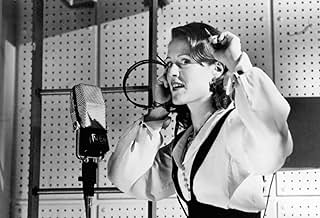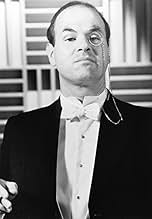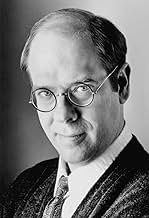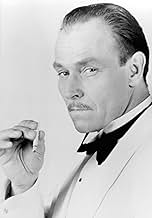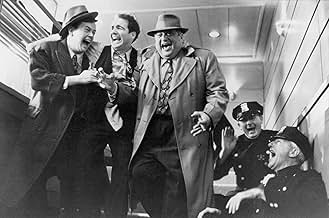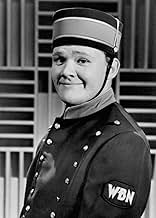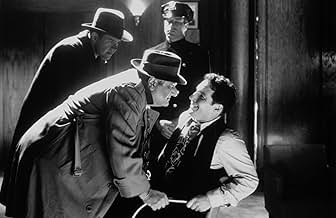IMDb RATING
6.2/10
4.1K
YOUR RATING
A series of mysterious crimes threatens the existence of a new radio network.A series of mysterious crimes threatens the existence of a new radio network.A series of mysterious crimes threatens the existence of a new radio network.
Featured reviews
The (normally) Jazz number "And The Angels Sing" behind the ending credits works its way through half a dozen musical styles, including a wildly improbable Western Swing.
Be sure to listen to the end.
Be sure to listen to the end.
Unfairly and almost universally trashed, this is a charming and atmospheric imagining of a hectic night in the life of a Chicago radio station whose ambition it is to go national. The sponsors are a tough sell, nothing is going as planned, and everything is pure chaos, compounded by a mounting tally of murder victims.
"Radioland Murders" is one of the noisiest and busiest live-action movies I've seen, literally wall-to-wall in every frame with rapid-fire slapstick and pratfalls, and it does not quite work as a comedy, but even as a comedy, it's breezy and pleasant in the face of its frenzied pace -- not unlike an old Warner Bros. cartoon of the Merrie Melodies variety. Better, though, it works as a nostalgic notion of old-time radio. The staggering gaps in logic and plot are meant to be ignored, as this is fantasy; it embraces the idea of radio in its heyday as the missing link between paperback adventures and television, requiring the listener's imagination to do half the work, while television requires none of it. The movie amounts to what could likely be a 9-year old listener's visual projection of what he's hearing on the radio.
It's technically dazzling, too, with the lens darting into rooms, out of windows and around the action becoming its own frenetic participant, and there's some breathtaking shots of the exterior of the station, often accentuating its height and distance from the city street far below. Brian Benben and Mary Stuart Masterson might strike the same one or two chords throughout the movie, but they're likable, as is this movie. And Scott Michael Campbell is very funny as Billy the pageboy, a kind of wide-eyed Quentin Tarantino of the radio age; fast-talking (everyone in the film is fast-talking, actually) and easily distracted (the look on his face as he accidentally barges into the ladies' dressing room and becomes mesmerized by the sight of the topless actresses is priceless), his entire grammar and understanding of life is derived from the radio shows of which he has encyclopedic knowledge.
Finally, "Radioland Murders" closes with some wistfully ironic thoughts (the movie is mostly free of contemporary irony, with the exception of this and an unsuccessful line about warning labels on cigarette packs) about television (best summed up by three uniformed cops hypnotized by a cathode ray tube) and the immortality of radio. A movie more about myth than story, "Radioland Murders" is written in the scattershot style of the radio programs depicted. It might merely be a sanitized and moderate entertainment (particularly when viewed against something like "The Hudsucker Proxy"), but it's affectionate, features lively music, looks great, and is completely innocent.
"Radioland Murders" is one of the noisiest and busiest live-action movies I've seen, literally wall-to-wall in every frame with rapid-fire slapstick and pratfalls, and it does not quite work as a comedy, but even as a comedy, it's breezy and pleasant in the face of its frenzied pace -- not unlike an old Warner Bros. cartoon of the Merrie Melodies variety. Better, though, it works as a nostalgic notion of old-time radio. The staggering gaps in logic and plot are meant to be ignored, as this is fantasy; it embraces the idea of radio in its heyday as the missing link between paperback adventures and television, requiring the listener's imagination to do half the work, while television requires none of it. The movie amounts to what could likely be a 9-year old listener's visual projection of what he's hearing on the radio.
It's technically dazzling, too, with the lens darting into rooms, out of windows and around the action becoming its own frenetic participant, and there's some breathtaking shots of the exterior of the station, often accentuating its height and distance from the city street far below. Brian Benben and Mary Stuart Masterson might strike the same one or two chords throughout the movie, but they're likable, as is this movie. And Scott Michael Campbell is very funny as Billy the pageboy, a kind of wide-eyed Quentin Tarantino of the radio age; fast-talking (everyone in the film is fast-talking, actually) and easily distracted (the look on his face as he accidentally barges into the ladies' dressing room and becomes mesmerized by the sight of the topless actresses is priceless), his entire grammar and understanding of life is derived from the radio shows of which he has encyclopedic knowledge.
Finally, "Radioland Murders" closes with some wistfully ironic thoughts (the movie is mostly free of contemporary irony, with the exception of this and an unsuccessful line about warning labels on cigarette packs) about television (best summed up by three uniformed cops hypnotized by a cathode ray tube) and the immortality of radio. A movie more about myth than story, "Radioland Murders" is written in the scattershot style of the radio programs depicted. It might merely be a sanitized and moderate entertainment (particularly when viewed against something like "The Hudsucker Proxy"), but it's affectionate, features lively music, looks great, and is completely innocent.
Having spent three decades working in radio, I was encouraged by friends to pick this up on DVD. My impression is that the Lucas folks attempted to cram 10 pounds of stuff into a 5 pound bag. The potential is obviously present with a cast of extremely talented actors and even some of the folks who were a big part of radio history (George Burns and Rosemary Clooney), but someone (the Director? Producers? The Studio?) decided to increase the pace to the point where it feels like watching Spielberg's "1941" in fast-forward.
There is a stable full of interesting characters whom we never really get to know. Harvey Korman and Bobcat Goldthwait's characters obviously had some serious issues - but what was their story? The same with Brion James, Ned Beatty, and Jeffrey Tambor. Michael McKean's homage to Spike Jones was a joy, but too short, and there were too many missed opportunities to show what actually went on in radio broadcasts performed in front of a live audience. Sound effects played a major role, which was hinted at but never fully glorified in Christopher Lloyd's role. I would bet there is probably another whole movie sitting on the cutting room floor.
On the plus side, however, at least SOMEONE made the effort to capture the feel of major broadcast radio from it's heyday, and the look as well as the overall mood is fairly authentic. I appreciate that this is not a documentary, and the story itself is pure fantasy, but this film left me wanting more - like someone had torn half the pages out of a book. Perhaps, someday, the Lucas folks will release some kind of "director's cut" edition with restored scenes and a feature on the Golden Era of radio. Most people under the age of 50 have no idea of the remarkable entertainment that was available over the airwaves during this era - but for fans of the medium, and for those who have worked in it, this is a gem that will bring a smile.
There is a stable full of interesting characters whom we never really get to know. Harvey Korman and Bobcat Goldthwait's characters obviously had some serious issues - but what was their story? The same with Brion James, Ned Beatty, and Jeffrey Tambor. Michael McKean's homage to Spike Jones was a joy, but too short, and there were too many missed opportunities to show what actually went on in radio broadcasts performed in front of a live audience. Sound effects played a major role, which was hinted at but never fully glorified in Christopher Lloyd's role. I would bet there is probably another whole movie sitting on the cutting room floor.
On the plus side, however, at least SOMEONE made the effort to capture the feel of major broadcast radio from it's heyday, and the look as well as the overall mood is fairly authentic. I appreciate that this is not a documentary, and the story itself is pure fantasy, but this film left me wanting more - like someone had torn half the pages out of a book. Perhaps, someday, the Lucas folks will release some kind of "director's cut" edition with restored scenes and a feature on the Golden Era of radio. Most people under the age of 50 have no idea of the remarkable entertainment that was available over the airwaves during this era - but for fans of the medium, and for those who have worked in it, this is a gem that will bring a smile.
Radioland Murders is a movie that should be seen more than once because it is so fast-paced and contains lots of inside jokes....it helps to have worked in radio (i've been a control board operator for 6 yrs) to catch some of the adsurdity. In my opinion, it's mostly about "timing" because in radio "dead air" is a no-no....one program must flow into another (with commercials in between, of course)....the audience has no idea of the confusion going on behind the scenes! Watch the contrast of the writers' hectic schedule and the actors performing whatever they are given so smoothly...this script is well-written, I think. Dissect the lines and they work, like when Billy tells Mr. Henderson, "that's quite a reach, Mr. H". Just say it out loud and it has a rhyme to it. I love the part where the cops are staring at the TV test pattern!! Some of the silly parts were a bit too long for my taste, but the movie works on many humorous levels. I also enjoyed the 1930 popular lingo as dialog in places. And the last script Mr. Henderson delivers IS a pip and pulls it all together!
You can see what critics in 1994 were complaining about. You can get a headache from this movie. Gags are too snappy (too packaged), editing is too rapid (if someone trips over the shot is only just long enough to cover the actual tripping over - we don't see the crucial bit at the start where they don't trip over, or the bit at the end after they trip over), and there's not a single moment of still contemplation which would allow all the feverish activity to be as funny as it deserves to be. And while it's nice to see a film that doesn't milk its gags for more than they're worth, at least that would be a fault on the right side. Some of the comic ideas are just begging to be WALLOWED in. For example (I'm going to end up recommending this film, so if you don't want its best sight gag ruined, for God's sake skip the next paragraph)...
One of the radio serials is about an aristocratic English explorer and his native jungle sidekick. We hear the former saying things like `What ho, I mean to say, steady on, old chap', while the latter is going, `Ooga booga - me mongo mongo man' - then we see that the African is being played by a dopey-looking white man, and the Englishman is being played by a black (in a tuxedo). It's a glorious moment. We realise what if their roles had been reversed they would BOTH have been demeaned ... as it is, they merely look like a couple of prize wallies. Unfortunately, that's IT. If we'd seen more of this radio play - and got to watch the bemused/assured/disgusted/bored expressions on the faces of the two voice actors - it would have continued to be funny; it would have got even funnier. But we cut to some other zany thing or other and the moment is lost.
(To be fair, some throwaway gags - like the one involving the policemen and television - are true throwaway gags: snappiness suits them.)
But it works, on the whole. There are plenty of good jokes, many of which have been weakened by the style of presentation, but by no means destroyed. The radio performances are amazingly polished and varied - you'd swear that Lucas sent talent scouts back in time to 1939. Sure, the film wants to be more than a highly entertaining comedy variety show (it's also trying for murder mystery, love story, nostalgic reverie, and social commentary), so it fails on its own terms, but it IS a highly entertaining comedy variety show, which is good enough.
One of the radio serials is about an aristocratic English explorer and his native jungle sidekick. We hear the former saying things like `What ho, I mean to say, steady on, old chap', while the latter is going, `Ooga booga - me mongo mongo man' - then we see that the African is being played by a dopey-looking white man, and the Englishman is being played by a black (in a tuxedo). It's a glorious moment. We realise what if their roles had been reversed they would BOTH have been demeaned ... as it is, they merely look like a couple of prize wallies. Unfortunately, that's IT. If we'd seen more of this radio play - and got to watch the bemused/assured/disgusted/bored expressions on the faces of the two voice actors - it would have continued to be funny; it would have got even funnier. But we cut to some other zany thing or other and the moment is lost.
(To be fair, some throwaway gags - like the one involving the policemen and television - are true throwaway gags: snappiness suits them.)
But it works, on the whole. There are plenty of good jokes, many of which have been weakened by the style of presentation, but by no means destroyed. The radio performances are amazingly polished and varied - you'd swear that Lucas sent talent scouts back in time to 1939. Sure, the film wants to be more than a highly entertaining comedy variety show (it's also trying for murder mystery, love story, nostalgic reverie, and social commentary), so it fails on its own terms, but it IS a highly entertaining comedy variety show, which is good enough.
Did you know
- TriviaGeorge Lucas has stated that the two main characters, Roger and Penny Henderson, are actually the parents of Richard Dreyfuss' character Curt Henderson from American Graffiti (1973); making this film a bit of a semi-prequel.
- GoofsThe portrait in Gen. Whalen's office shows the general wearing a service dress green uniform which was not adopted by the U.S. Army until the mid-1950s. In 1939, when the movie is set, the general would have worn a khaki uniform.
- Quotes
Penny Henderson: I told Dexter not to smoke. If you ask me, they oughta put warning labels on those packages.
- SoundtracksThat Old Feeling
Written by Lew Brown and Sammy Fain
Performed by Rosemary Clooney
Courtesy of EMI Feist, Inc. and Bienstock Publishing Co.
- How long is Radioland Murders?Powered by Alexa
Details
Box office
- Budget
- $15,000,000 (estimated)
- Gross US & Canada
- $1,316,865
- Opening weekend US & Canada
- $835,570
- Oct 23, 1994
- Gross worldwide
- $1,316,865
- Runtime
- 1h 48m(108 min)
- Color
- Sound mix
- Aspect ratio
- 2.39 : 1
- 2.35 : 1
Contribute to this page
Suggest an edit or add missing content


